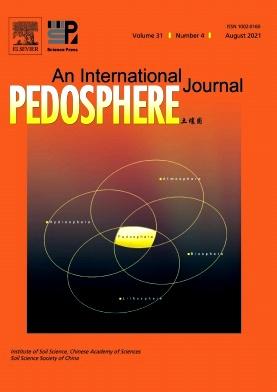外源施用人工腐殖质可改善土壤性质和提高水稻产量
IF 7.3
2区 农林科学
Q1 SOIL SCIENCE
引用次数: 0
摘要
由于生物和非生物因素造成的土壤肥力严重退化,东北黑土地区水稻产量持续下降。人工腐殖质(A-HS)因其具有较高的成本效益和提高土壤肥力的潜力而受到广泛关注。然而,A-HS对水稻苗圃土壤养分含量的具体影响尚不清楚。本研究系统考察了合理施用A-HS对东北千峰农场土壤养分周转和产量的影响,并分析了土壤养分和微生物群落的变化。结果表明,施用A-HS显著提高了原生土和幼苗土的溶解有机质和养分含量。此外,还能有效促进幼苗成熟期根系生长和产量。更有趣的是,A-HS的施用显著改变了Noviherbaspirillum、Klebsiella和Pedobacter等促进植物生长的根瘤菌,促进了自然屏障的形成和土壤养分的转化。综上所述,A-HS通过改变土壤细菌群落,显著提高了作物养分的吸收和积累。总的来说,在水稻生产中应用A-HS是有利可图的和可持续的。目前的研究从多个方面为A-HS在促进作物生长发育方面的益处提供了有价值的见解,这可能对农业和粮食安全具有重要意义。本文章由计算机程序翻译,如有差异,请以英文原文为准。
Exogenous application of artificial humic substance can improve black soil properties and rice yield
Rice yield in the black soil region of Northeast China has been declining due to severe soil fertility degradation caused by both biotic and abiotic factors. Artificial humic substance (A-HS) has attracted much attention due to its high cost-effectiveness and great potential to improve soil fertility. However, the specific effects of A-HS on nutrient contents in rice nursery soils remain unclear. This study systematically investigated the effects of rational application of A-HS on soil nutrient turnover and yield and analyzed the changes in soil nutrients and microbial communities at Qianfeng Farm, Northeast China. The results indicated that the application of A-HS significantly increased soil dissolved organic matter and nutrient contents in the native and seedling soils. In addition, the root growth and yield of the seedlings at maturity were effectively promoted. More interestingly, the application of A-HS significantly altered plant growth-promoting rhizobacteria, such as Noviherbaspirillum, Klebsiella, and Pedobacter, improving natural barrier formation and soil nutrient conversion. It could be concluded that A-HS significantly enhanced crop nutrient uptake and accumulation by altering soil bacterial communities. In general, the application of A-HS could be profitable and sustainable in rice production. The current study from multiple aspects provides valuable insights into the benefits of A-HS in promoting crop growth and development, which could have important implications for agriculture and food security.
求助全文
通过发布文献求助,成功后即可免费获取论文全文。
去求助
来源期刊

Pedosphere
环境科学-土壤科学
CiteScore
11.70
自引率
1.80%
发文量
147
审稿时长
5.0 months
期刊介绍:
PEDOSPHERE—a peer-reviewed international journal published bimonthly in English—welcomes submissions from scientists around the world under a broad scope of topics relevant to timely, high quality original research findings, especially up-to-date achievements and advances in the entire field of soil science studies dealing with environmental science, ecology, agriculture, bioscience, geoscience, forestry, etc. It publishes mainly original research articles as well as some reviews, mini reviews, short communications and special issues.
 求助内容:
求助内容: 应助结果提醒方式:
应助结果提醒方式:


